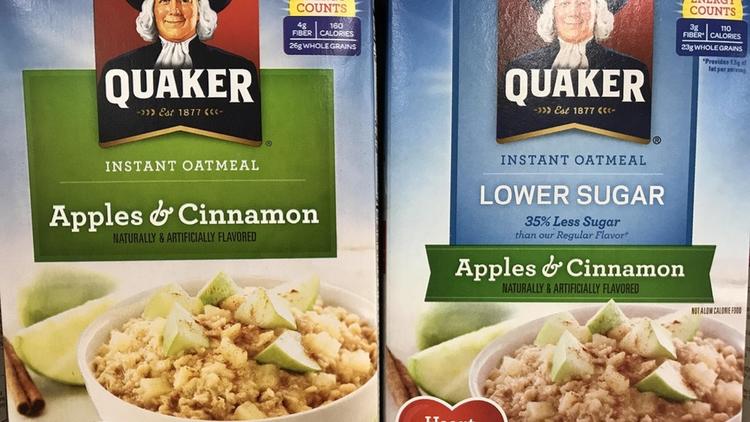Today a post made the (well, my) front page on Reddit.
TIL (Today I Learned) Quaker Oats 35% Less Sugar Oatmeal contains 35% less oatmeal per packet, despite being the same price as the regular version. It linked to an LA times article from two years ago titled “Quaker Oats boast 35 percent less sugar, actually just a smaller packet.” I recommend reading the article and the Reddit comments.
It just so happens that there’s fantastic academic research on the topic of fooling calorie-conscious consumers.
Regardless of packaging labeling, the effect of different rectangular dimensional ratios on purchase intention has been shown to have an effect on people’s perception (1). Food in taller (vertically slim, as against wider) packaging is perceived to have fewer calories, which increases choice likelihood among calorie conscious calorie-conscious consumers (as against shoppers who are buying for taste, sometimes called ‘hedonic’ shoppers). Subconsciously thinking they’re consuming a lower calorie food, calorie-conscious consumers will then consume more of that product (2). Narrower boxes also increases product attitude for products positioned as being healthy (e.g. through a label that says “lower sugar” (3). I don’t think Quaker are doing this in this instance, especially as they’d have to buy different sized boxes, nor do I have data on how frequently companies invest in a different box size, but it’s something to look out for.

Final consequences of exploiting consumers cognitive biases when it comes to volume perception extends beyond choosing the products off the shelf and and consuming it. It ends with post-consumption satisfaction, which may be an intended or unintended by the manufacturer. I am of course talking about the scale with buyer’s remorse on one end, and brand evangelism on the other. One study shows that consumers experience buyer’s remorse when a they realise they have consumed more than they intended after they were duped by packaging of a different shape (4).
Australian low-sodium Weetbix for Kids was also exposed for not being available in bulk, and being more expensive on The Checkout.
In both cases we see negative press coverage and online discussion as a result of Quaker’s severe short-changing of customers, although Sanitarium’s decision not to sell bulk size of a product can be justified by market demand, or lack thereof. There’s a lesson for Quaker here, but it’s also one of common sense which the company knew already. I hope they’re able to assign an expense number to this blunder, or rather, in essence quantifiy how this bad practice has hurt the company. If nothing else, it’s money that these corporations think and communicate in.
Refs:
(1) Raghubir, P., & Greenleaf, E. A. (2006). Ratios in Proportion: What Should the Shape of the Package Be? Journal of Marketing, 70(2), 95–107.
(2) Koo, J., & Suk, K. (2016). The effect of package shape on calorie estimation. International Journal of Research in Marketing, 33(4), 856–867.
(3) van Ooijen, I., Fransen, M. L., Verlegh, P. W. J., & Smit, E. G. (2017). Signalling product healthiness through symbolic package cues: Effects of package shape and goal congruence on consumer behaviour. Appetite, 109, 73–82.
(4) Raghubir, P., & Krishna, A. (1999). Vital Dimensions in Volume Perception: Can the Eye Fool the Stomach? Journal of Marketing Research, 36(3), 313.





